|
|
|
Sort Order |
|
|
|
Items / Page
|
|
|
|
|
|
|
| Srl | Item |
| 1 |
ID:
106039


|
|
|
|
|
| Publication |
2011.
|
| Summary/Abstract |
By analysing school memorial ceremonies in Israel, this article demonstrates how dominant groups in Israeli society (upper- and middle-class, secular, educated Jews of European origin) exploit their historical monopoly over the Israeli warrior ethos in order to retreat from their unconditional commitment to the state and the military, which stands at the very core of traditional 'heroic nationalism'. Nonetheless, despite their withdrawal from the military ethos, analysis of the school ceremonies shows that rather than distancing themselves from the national collective, they are promoting a different kind of nationalism - one that I term 'traumatic nationalism'. This model departs from the warrior ethos and places mourning and a feeling of victimhood at its centre. Thus, through the arena of education, the dominant groups - which mark out the global as their sphere of action - promote a model of nationalism that meets the demands of the post-national discourse.
|
|
|
|
|
|
|
|
|
|
|
|
|
|
|
|
| 2 |
ID:
106036


|
|
|
|
|
| Publication |
2011.
|
| Summary/Abstract |
The fate of missing persons is a central issue in post-conflict societies facing truth recovery and human rights dilemmas. Despite widespread public sympathy towards relatives, societies emerging from conflict often defer the recovery of missing for decades. More paradoxically, in post-1974 Cyprus, the official authorities delayed unilateral exhumations of victims buried within cemeteries in their own jurisdiction. Analysis of official post-1974 discourses reveals a Greek-Cypriot consensus to emphasise the issue as one of Turkish aggression, thus downplaying in-group responsibilities and the legacy of intra-communal violence. We compare the experience of Cyprus with other post-conflict societies such as Spain, Northern Ireland, and Mozambique and explore the linkages between institutions and beliefs about transitional justice. We argue that elite consensus initiates and facilitates the transition to democracy but often leads to the institutionalisation of groups opposing truth recovery even for in-group members.
|
|
|
|
|
|
|
|
|
|
|
|
|
|
|
|
| 3 |
ID:
106040
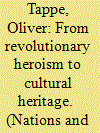

|
|
|
|
|
| Publication |
2011.
|
| Summary/Abstract |
Museum exhibitions in Laos represent two main strands of Lao national identity discourse. First, they glorify the 'liberation struggle' of the so-called 'Lao multiethnic people' under the leadership of the Lao People's Revolutionary Party, and therefore serve as important ideological tools for the current regime's self-legitimisation. Second, they display the history and cultural heritage of the Lao nation, providing the postcolonial state with a narrative of historical continuity and civilisation that is focused mostly on the dominant ethnic Lao culture. This article explores the contradictions within official images of the Lao nation-state and how these opposing strands of national identity compete or interact. Museums as key arenas of ideological tensions constitute illuminating fields of research on discourses of national identity in Laos.
|
|
|
|
|
|
|
|
|
|
|
|
|
|
|
|
| 4 |
ID:
106042


|
|
|
|
|
| Publication |
2011.
|
| Summary/Abstract |
American history textbooks for the USA's public schools act as quasi-official loci for the renegotiation of national identity and are, as such, subject to much controversy. The choice of heroes and the way in which textbooks depict them display the interplay between competing visions of popular ethno-history and scholarly historiography. This article examines contemporary renegotiation of the national narrative through an analysis of the evolving representation of the USA's two most prominent traditional national heroes - George Washington and Abraham Lincoln - in history textbooks for elementary-school students published from the early 1980s to 2003. This period marks the development of the multiculturalist movement and its subsequent conservative backlash, with debates intensifying in the wake of the events of 11 September 2001.
|
|
|
|
|
|
|
|
|
|
|
|
|
|
|
|
| 5 |
ID:
106041


|
|
|
|
|
| Publication |
2011.
|
| Summary/Abstract |
This article revisits the notion of linguistic diversity and its function as a political cleavage. It argues that people's linguistic and cultural attitudes are influenced not only by their communicative practice but also by their identification with particular language(s) - even though they may not always communicate in that language. In Ukraine, from which my empirical data is drawn, language identity is embodied in the concept of native language that was imposed by the Soviet institutionalisation of ethnicity and came to mean ethnic belonging as much as linguistic practice. My analysis of survey data demonstrates that native language is a powerful predictor of people's attitudes and policy preferences with regard to both language use and other socially divisive issues, such as foreign policy and historical memory. This finding should also be applicable to other societies with a large-scale discrepancy between language practice and identity.
|
|
|
|
|
|
|
|
|
|
|
|
|
|
|
|
| 6 |
ID:
106034
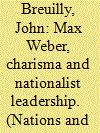

|
|
|
|
|
| Publication |
2011.
|
| Summary/Abstract |
One of Max Weber's most well-known achievements was the formulation of three concepts of legitimate authority: traditional, legal-rational and charismatic. However, there are particular problems with the last of these, which is not historically grounded in the manner of the other two concepts. The charisma concept originated with Weber's sociology of religion, was pressed into service in pre-war writing on the sociology of domination, shifted focus in his wartime political writings and changed meaning again in his post-war writing on basic sociological concepts. To use the concept in historical-political analysis, I argue, one must distinguish between a pre-modern and modern form of charismatic domination. I argue that doing this enables us to understand features of the leadership of colonial nationalist and fascist movements.
|
|
|
|
|
|
|
|
|
|
|
|
|
|
|
|
| 7 |
ID:
106035
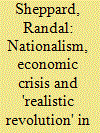

|
|
|
|
|
| Publication |
2011.
|
| Summary/Abstract |
This article examines how the Mexican state drew upon nationalist discourse for legitimacy following the 1982 debt crisis. The analytical framework situates Mexico within the context of Latin American nationalism and explores the structural and conjunctural factors that contributed to the endurance and effectiveness of Mexican revolutionary nationalism as a hegemonic nationalist discourse. Historical commemorations during the Miguel de la Madrid administration (1982-88) are then examined to show how the state evoked nationalist motifs as it dealt with economic crisis, pressure from the USA, domestic political opposition and the implementation of neoliberal reforms. The relative effectiveness of sometimes counterintuitive appeals to nationalist legitimacy is found to be neither wholly 'rational' nor 'irrational', in this case having its basis in a history of elite and popular negotiation through the revolutionary nationalist framework, the continuity of the post-revolutionary Partido de la Revolución Institutional (PRI) state model and the lack of a viable competing paradigm.
|
|
|
|
|
|
|
|
|
|
|
|
|
|
|
|
| 8 |
ID:
106037
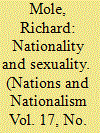

|
|
|
|
|
| Publication |
2011.
|
| Summary/Abstract |
This article seeks to understand why attitudes towards homosexuality in Latvia appear to be more intolerant than in all other EU member states. It argues that, while the impact of religion, the legacy of communism and post-communist transition have all played a role in shaping attitudes towards homosexuality in Central and Eastern Europe, these factors do not explain sufficiently the divergence among post-communist states and, in particular, do not account for Latvia's extreme position. While acknowledging that intolerance towards non-heteronormative sexuality cannot be explained by a single factor but is the cumulative effect of a range of social influences, this study argues that homosexuality is particularly reviled in Latvia because it has been constructed discursively as a threat to the continued existence of the nation in its desired ethnic form and to the core values defining Latvian national identity.
|
|
|
|
|
|
|
|
|
|
|
|
|
|
|
|
| 9 |
ID:
106038
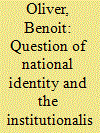

|
|
|
|
|
| Publication |
2011.
|
| Summary/Abstract |
This article argues for a close relationship between national identity and the institutionalisation of the visual arts in Grenada. Art, which is intrinsic to all humans, predates its institutionalisation: it is only institutionalised in societies with a strong sense of national identity. In order to explain the role of national identity in the formation of national art, the article begins by examining the period following World War II, when Grenada - still under British colonialism - was undergoing intense social and political changes. To understand these changes, the analysis of the stratification system is paramount. The article delineates three groups on the basis of the value systems developed historically: the elite, the masses and a small, growing middle class situated between these two groups. The works of three prominent Grenadian artists illustrate the argument that institutionalisation of art requires a strong sense of national identity, and through this process the artistic development of a society occurs. Furthermore, understanding this process requires a focus on the ways in which social and political groups or classes impeded the development of a national identity, preventing the institutionalisation of the arts.
|
|
|
|
|
|
|
|
|
|
|
|
|
|
|
|
|
|
|
|
|